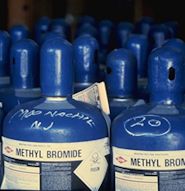RALEIGH – The state Department of Environmental Quality’s Division of Air Quality wants to hear from the public on the proposed air quality rule changes to regulate emissions of methyl bromide at log fumigation operations.
The division is set to host public hearings on the proposed rules at 6 p.m. July 22 at the Department of Environmental Quality, Green Square Training Room 1210, 217 W. Jones St., Raleigh, and at 6 p.m. July 23 in Cape Fear Cape Fear Community College, Union Station, 502 N. Front St., Wilmington.
Supporter Spotlight

Written comments will be accepted until Aug. 16 by email to daq.publiccomments@ncdenr.gov with the subject line “Log Fumigation” or mailed to Patrick Knowlson, Division of Air Quality, 1641 Mail Service Center, Raleigh, NC 27699-1641.
The proposed rule, amendment, and a note on the rule’s fiscal effects are available online.
Because there was no specific federal or state regulatory measures for the use of methyl bromide, a hazardous air pollutant that creates a potential public health risk, the division proposed regulation by establishing an acceptable ambient level, DEQ announced Tuesday.
Among the health concerns related to the odorless, colorless gas are neurological and respiratory effects. The recent increase in businesses interested in using methyl bromide for log fumigation in North Carolina prompted the division to recommend the Environmental Management Commission develop a rule to require log fumigation operations to take appropriate measures to safeguard public health and ask the Secretaries’ Scientific Advisory Board to consider setting an acceptable level for methyl bromide and to designate it as a toxic air pollutant.
The proposed rule establishes emission control requirements for hazardous air pollutants and toxic air pollutants from log fumigation operations. A proposed amendment adds methyl bromide to the toxic air pollutant list with an AAL value of 0.005mg/m3, or milligrams per cubic meter, with a 24-hour averaging time. The Environmental Management Commission also seeks public comment on a range for the acceptable ambient level from 0.005 mg/m3 to 0.078 mg/m3.







